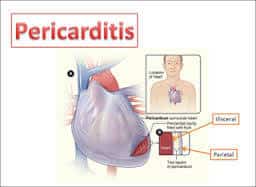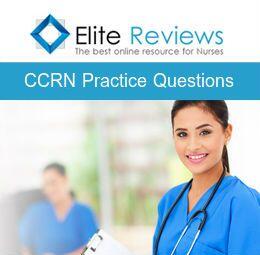CCRN Pericarditis
CCRN Pericarditis Overview
Pericarditis is swelling and irritation of the pericardium, the thin sac-like membrane surrounding your heart. Pericarditis often causes chest pain and sometimes other symptoms. The sharp chest pain associated with pericarditis occurs when the irritated layers of the pericardium rub against each other. Pericarditis usually begins suddenly but doesn’t last long (acute). When symptoms develop more gradually or persist, pericarditis is considered chronic. Most cases are mild and usually improve on their own. Treatment for more-severe cases may include medications and, rarely, surgery. Early diagnosis and treatment may help to reduce the risk of long-term complications from pericarditis.
Signs and Symptoms
Acute pericarditis usually lasts less than a few weeks. Chronic recurrent pericarditis has two types, including the incessant type which occurs within six weeks of weaning medical treatment for an acute episode, and the intermittent type which occurs after six weeks.
If you have acute pericarditis, the most common symptom is sharp, stabbing chest pain behind the breastbone or in the left side of your chest. However, some people with acute pericarditis describe their chest pain as dull, achy or pressure-like instead, and of varying intensity.
Chronic pericarditis is usually associated with chronic inflammation and may result in fluid around the heart (pericardial effusion). The most common symptom of chronic pericarditis is chest pain.
Depending on the type, signs and symptoms of pericarditis may include some or all of the following:
-
- Sharp, piercing chest pain over the center or left side of the chest
- Shortness of breath when reclining
- Heart palpitations
- Low-grade fever
- An overall sense of weakness, fatigue or feeling sick
- Cough
- Abdominal or leg swelling
Causes
Under normal circumstances, the two-layered pericardial sac that surrounds your heart contains a small amount of lubricating fluid. In pericarditis, the sac becomes inflamed and the resulting friction from the inflamed sac leads to chest pain.
The cause of pericarditis is often hard to determine. In most cases, doctors either are unable to determine a cause (idiopathic) or suspect a viral infection.
Other causes of pericarditis include:
-
-
- Systemic inflammatory disorders. These may include lupus and rheumatoid arthritis.
- Trauma. Injury to your heart or chest may occur as a result of a motor vehicle or other accident.
- Other health disorders. These may include kidney failure, AIDS, tuberculosis and cancer.
- Certain medications. Some medications can cause pericarditis, although this is unusual.
-
Complications
-
-
- Constrictive pericarditis. Although uncommon, some people with pericarditis, particularly those with long-term inflammation and chronic recurrences, can develop permanent thickening, scarring and contraction of the pericardium.
In these people, the pericardium loses much of its elasticity and resembles a rigid case that’s tight around the heart, which keeps the heart from working properly. This condition is called constrictive pericarditis and often leads to severe swelling of the legs and abdomen, as well as shortness of breath.
- Constrictive pericarditis. Although uncommon, some people with pericarditis, particularly those with long-term inflammation and chronic recurrences, can develop permanent thickening, scarring and contraction of the pericardium.
-
Diagnosis
-
-
- Electrocardiogram (ECG)
- Chest X-ray
- Computerized tomography (CT)
- Cardiac magnetic resonance imaging (MRI)
-
Treatment
Severe cases may require one or more of the following:
-
-
-
- pericardiocentesis to treat pericardial effusion/tamponade
- antibiotics to treat tuberculosis or other bacterial causes.
- steroids are used in acute pericarditis but are not favored because they increase the chance of recurrent pericarditis.
- in rare cases, surgery
- in cases of constrictive pericarditis, pericardiectomy
-
-
Critical Care Courses
Overview
- Elite Reviews Offers A Variety Of Online Courses That Will More Than Adequately Help Prepare The Critical Care Nurse To Pass The National Exam.
- Each Course Includes Continuing Education Credit and Sample Questions.
Continuing Education
- Each Of Our Online Courses Has Been Approved Continuing Education Contact Hours by the California Board of Nursing
- Login To Your Account In Order To Access The Course Completion Certificate Once The Course Is Complete.
CCRN Free Trial
- FREE Sample Lecture & Prep Questions
- Available For 24 Hrs After Registration
- Click Free Trial Link To Get Started – CCRN Free Trial
How It Works
How It Works
- First – Purchase The Course By Clicking On The Blue Add To Cart Button – You Will Then Be Prompted To Create A User Account.
- Second – After Creating An Account, All 3 Options (90, 120 or 150 Days) Will Be Listed. Select The Option You Desire And Delete The Other Two.
- Third – You Will Be Prompted To Pay For The Review Using PayPal – After Payment You Will Be Redirected Back To Your Account.
- Last – Click The Start Button Located Within Your Account To Begin The Program
- 150 Sample Questions
- Q & A With Rationales
- Approved For 5 CEU’s
- 90 Days Availability
- Cost $75.00
- 1250+ Sample Questions
- Q & A With Rationales
- Approved For 25 CEU’s
- 90 Days Availability
- Cost $200.00
CCRN Practice Questions Bundle
- 1350+ Sample Questions
- Q & A With Rationales
- Approved For 30 CEU’s
- 90 Days Availability
- Cost $225.00
CCRN Review Course
- Option 1
- Lectures & 1250+ Questions
- Approved For 35 CEU’s
- 90 Days Availability
- Cost $325.00
- Option 2
- Lectures & 2000+ Questions
- Approved For 40 CEU’s
- 90 Days Availability
- Cost $350.00
CCRN Review Course Bundle
- Option 3
- Lectures & 3000+ Questions
- Approved For 70 CEU’s
- 90 Days Availability
- Cost $375.00






